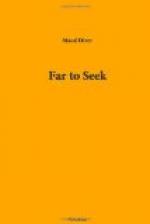“ROY, SON OF MY HEART,—This is good-bye—but not altogether good-bye. Between you and me that word can never be spoken. So I am writing this, in my foolish weakness, to beg of you—by the love between us, too deep for words—not to let heart and courage be quite broken because of this big sorrow. You were brave in battle, my Prithvi Raj. Be still more brave for me. Remember I am Lilamani—Jewel of Delight. That I have tried to be in my life, for every one of you. That I wish to be always. So I ask you, my darling, not to make me a Jewel of Sorrow because I have passed into the Next Door House too soon. Though not seen, I will never for long be far from you. That is my faith; and you must share it; helping your dear father, because for him the way of belief is hard.
“Never forget those beautiful words of Fouquet in which you made dedication of your poems to me: ’How blessed is the son to whom it is allowed to gladden his mother’s heart with the blossom and fruit of his life!’ And you will still gladden it, Dilkusha.[5] I will still share your work, though in different fashion than we hoped. Only keep your manhood pure and the windows of your spirit clear, so the Light can shine through. Then you will know if I speak truth, and you will not feel altogether alone.
“Oh, Roy, I could write and write till the pen drops. My heart is too full, but my hand is too feeble for more. Only this, when your time comes for marriage, I pray you will be to your wife all that your splendid father has been for me—king and lover and companion of body and spirit. Draw nearer than ever, you two, because of your so beautiful love for me—unseen now, but with you always. God bless you. I can write no more.
“Your
devoted
MOTHER.”
The last lines wavered and ran together. In spite of her injunction, tears would come. Chill and unheeded, they slipped down his cheeks, while he folded his treasure, and put it away with the other, that went to his head, a little, as she had foreseen; though in the event, it had been overshadowed by her own, than which she could have left him no dearer legacy. In life she had been an angel of God. In death, she was still his angel of comfort and healing. She had bidden him share her belief; and he never had felt altogether alone. Sustained by that inner conviction, he had somehow adapted himself to the strangeness of a life empty of her physical presence. The human being, in a world of pain, like the insect in a world of danger, lives mainly by that same ceaseless, unconscious miracle of adaptation. Dearly though he craved a sight of his father and Christine, he had not asked for leave home. There were bad moments when he wondered if he could ever bring himself to face the ordeal. He sincerely hoped they understood. Their letters left an impression that it was so. Jeffers obviously did.




